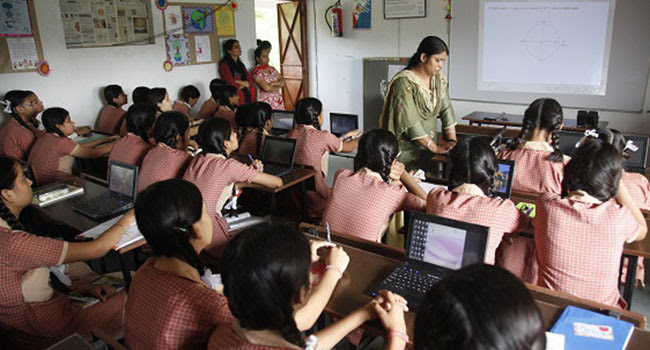Aug 01 2016
:
The Times of India
(NaviMumbai)
Research, innovate, invent, PM tells youth
New Delhi:
TIMES NEWS NETWORK
|
Curb Deaths During Child Birth: Modi
Prime Minister Narendra Modi
on Sunday pitched for technological solutions to day-to-day problems
and exhorted the youth to go for research and innovation in a big way
and use central schemes like `Atal Innovation Mission' which the
government has devised to create an ecosystem of innovation, experiment
and entrepreneurship in the country . “If we have to create next
generation of innovators, we will have to prepare our
children for that and therefore the government has taken initiative of
setting up `Atal Tinkering Labs' (ATLs) in schools,“ Modi said in his
monthly radio programme `Mann Ki Baat'.
He said if any school established such lab, it would get Rs 10 lakh and an equal amount for maintenance of these labs for five years.
The objective of ATLs, being established under the `Atal Innovation Mission' (AIM), is to foster curiosity , creativity and imagination in young minds.
Noting that innovation was directly linked to 'Incubation Centre', Modi said under the `Atal Incubation Centre' (AIC) programme, the government plans to earmark a “big amount“ of Rs 10 crore (to each AIC for five years to cover the capital and operational expenditure cost in running the centre).
Such centres will support and encourage startups to become successful enterprises. It will provide ade quate infrastructure along with high quality assistance or services to start-ups in their early stages of growth.
Inviting youth to do research and invent solutions through technology to the problems they see, the PM also referred to the 'Atal Grand Challenges' and said, “The government of India wants to reward technology that is developed to address our problems.“
He said this will be the real tribute to former President APJ Abdul Kalam, whose first death anniversary was observed four days ago. “The more our young generation works for research, innovation and inventing technology for solutions to our daily life problems, it will contribute immensely to making of the modern India of 21st centu ry and that will be the real tribute to Abdul Kalam,“ Modi said.
In his 'Mann Ki Baat', the PM also talked about a number of other subjects, including Indian participation in the Rio Olympics, his recent visit to South Africa and passage of a bill by Parliament that aims to provide huge money to states for their compensatory afforestation programme.
During the 35-minute broadcast, he also spoke about the need to curb deaths during child delivery and said government hospitals will offer free check-up on the 9th of every month which poor pregnant women should avail. He urged gynaecologists, who do not work in government hospitals, to devote one day for this purpose.
He said if any school established such lab, it would get Rs 10 lakh and an equal amount for maintenance of these labs for five years.
The objective of ATLs, being established under the `Atal Innovation Mission' (AIM), is to foster curiosity , creativity and imagination in young minds.
Noting that innovation was directly linked to 'Incubation Centre', Modi said under the `Atal Incubation Centre' (AIC) programme, the government plans to earmark a “big amount“ of Rs 10 crore (to each AIC for five years to cover the capital and operational expenditure cost in running the centre).
Such centres will support and encourage startups to become successful enterprises. It will provide ade quate infrastructure along with high quality assistance or services to start-ups in their early stages of growth.
Inviting youth to do research and invent solutions through technology to the problems they see, the PM also referred to the 'Atal Grand Challenges' and said, “The government of India wants to reward technology that is developed to address our problems.“
He said this will be the real tribute to former President APJ Abdul Kalam, whose first death anniversary was observed four days ago. “The more our young generation works for research, innovation and inventing technology for solutions to our daily life problems, it will contribute immensely to making of the modern India of 21st centu ry and that will be the real tribute to Abdul Kalam,“ Modi said.
In his 'Mann Ki Baat', the PM also talked about a number of other subjects, including Indian participation in the Rio Olympics, his recent visit to South Africa and passage of a bill by Parliament that aims to provide huge money to states for their compensatory afforestation programme.
During the 35-minute broadcast, he also spoke about the need to curb deaths during child delivery and said government hospitals will offer free check-up on the 9th of every month which poor pregnant women should avail. He urged gynaecologists, who do not work in government hospitals, to devote one day for this purpose.





